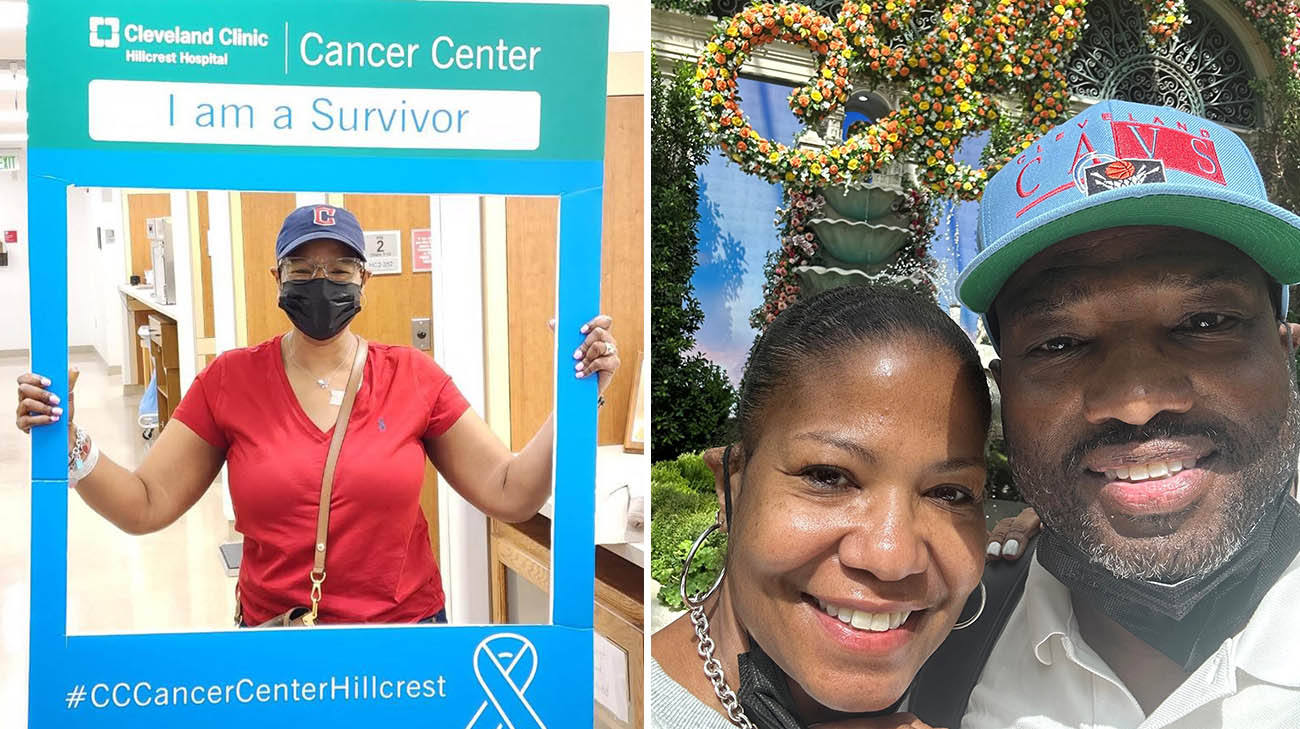
When Erica Watson was growing up, protective plastic was on the living room furniture. Fancy towels were decorative and not to be used. China and crystal remained in the cabinet.
Now, after a year-long and successful battle with triple-negative breast cancer, Erica uses her fancy dishes. “Why save those things?” she asks. “I want to see it, use it and experience it.”
Breast cancer is the second most common cancer in women, while triple-negative breast cancer makes up 15% of breast cancer cases. It typically affects younger women (40 years old and younger) and disproportionately affects women of color.
Doctors diagnosed Erica with triple-negative breast cancer at the age of 51 after she experienced pain, and subsequently felt a lump, in her breast. Although there is breast cancer in her family, Erica says she was shocked because she had stayed on top of her health, including regular mammograms.
The diagnosis, testing and information were overwhelming for Erica, so she leaned on Sam, her husband of 34 years. “I’m so glad he was there with me at the appointment,” she says, “because I heard nothing after the words triple-negative.”

Erica's family was an incredible support throughout her breast cancer journey. (Courtesy: Erica Watson)
Medical oncologist Daniel Silbiger, DO, says Erica was highly motivated to get a treatment plan established and started as soon as possible. He says Erica’s positive attitude has been a benefit throughout her cancer journey.
“Having what I call ‘mental fitness’ is almost half the battle,” Dr. Silbiger says. “There are going to be ups and downs along the way but focusing on the wins helps patients overcome setbacks.”
Dr. Silbiger leads the breast cancer program at Cleveland Clinic Hillcrest Hospital and its multi-disciplinary tumor board. He says it takes a team of healthcare professionals to review, discuss and develop individualized care plans for patients.
“I had an amazing team,” Erica says. “I feel like they were put together specifically for me.” She credits Dr. Silbiger and his team members, Kristi Mele, certified nurse practitioner, and Katie Vriezen, nurse coordinator, for their care throughout her treatment. “I absolutely love them,” Erica says.
In addition, psychologist Kathleen Ashton, PhD, continues to provide tremendous emotional and psychological support, Erica says. Julie Lang, MD, breast surgeon; Graham Schwarz, MD, plastic surgeon; and Betty Obi, MD, radiation oncologist, also helped develop Erica’s comprehensive treatment plan and provided their expertise to guide Erica’s care.
About two weeks after being diagnosed, Erica received her first of 16 chemotherapy treatments. She then had a lumpectomy, reconstructive surgery and 15 rounds of radiation therapy.
Erica didn’t want to lose herself during her months of challenging treatment sessions, so she practiced self-care by getting manicures and pedicures and bought stylish scarves and baseball caps – many of them in her favorite color pink -- for when she lost her hair during chemo.
Throughout her treatment, Erica took things one step at a time. After each stage was complete, she celebrated and moved on to the next. “It was full speed ahead. I broke it down into little milestones,” she says. “I did what I had to do to survive. I believed I had more life to live.”
After she completed chemotherapy, the surgical pathology report showed no evidence of disease. Erica had a complete response to treatment, and her tumor was gone. She celebrated by taking a vacation with Sam.

After receiving the news she no longer showed evidence of cancer, Erica celebrated by taking a vacation with Sam. (Courtesy: Erica Watson)
“My husband, my three adult daughters and my eight-year-old granddaughter kept me going,” Erica says. The immediate family stayed with Erica and Sam at their home in Solon, Ohio, to support her throughout the journey. “I tried to do as much as I could to keep life as normal as possible. I had to keep going.”
Erica says her sister, also a triple-negative breast cancer survivor for 14 years, was involved and helpful throughout treatment. “She could tell me what I was feeling was completely normal.”
When asked about her positive attitude, Erica says it comes from her Christian faith. She listened to worship music, her church community lifted her up in prayer and a strong group of friends who are women texted her to see how she was doing. Erica continues being an advocate for breast cancer awareness, especially among Black women, who are more likely to develop aggressive triple-negative breast cancer.

Erica's message to others is to live for today. She continues enjoying her favorite pastimes and time spent with family and friends. (Courtesy: Erica Watson)
“We need to lock arms with each other, hold each other up and encourage those battling cancer,” Erica says. Her advice for others with cancer is to live for today. “Stop saving things for a special day. Every day I wake up in the morning is a special day.”
“As tragic as it was, I love talking about my cancer journey,” Erica continues. “I see myself through a different lens. I have a strength I didn’t know I had before. There is life after a breast cancer diagnosis.”
Related Institutes: Cleveland Clinic Cancer Center

